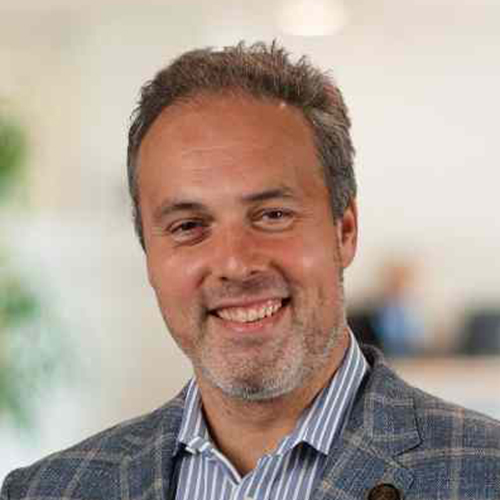Wearable sensing for health and performance
Recent advances in digital health technologies are enabling biomedical researchers to reframe health optimization and disease treatment in a patient-specific, personalized manner. Rather than a one-size-fitsall paradigm, the charge is for a particular profile to be fit to each patient, and for disease treatment (or wellness) strategies to then be tailored accordingly. Wearable sensing can play an important role in this effort by augmenting existing research in -omics and medical imaging towards better developing such personalized models and phenotypic assays for patients, and in continuously adjusting such models to optimize therapies in real-time to meet patients’ changing needs. While in many instances the focus of such efforts is on disease treatment, optimizing performance for healthy individuals is also a compelling need. This talk will focus on research on non-invasive wearable sensing of human physiology, with application to biomechanics, cardiovascular, and pulmonary monitoring applications. A specific focus of the talk will be on recent technologies leveraging acoustics and vibration sensing for these applications, including the sounds emitted by the joints during movement, the vibrations of the body in response to the heartbeat, and lung sounds. Ultimately, such technologies can enable personalized titration of care and optimization of performance to reduce injuries and rehabilitation time for athletes and soldiers, improve the quality of life for patients with heart disease and chronic obstructive pulmonary disease, and reduce overall healthcare costs.
Date and Time
Location
Hosts
Registration
Speakers
 Dr. Omer Inan of Georgia Institute of Technology
Dr. Omer Inan of Georgia Institute of Technology
Wearable sensing for health and performance
Recent advances in digital health technologies are enabling biomedical researchers to reframe health optimization and disease treatment in a patient-specific, personalized manner. Rather than a one-size-fitsall paradigm, the charge is for a particular profile to be fit to each patient, and for disease treatment (or wellness) strategies to then be tailored accordingly. Wearable sensing can play an important role in this effort by augmenting existing research in -omics and medical imaging towards better developing such personalized models and phenotypic assays for patients, and in continuously adjusting such models to optimize therapies in real-time to meet patients’ changing needs. While in many instances the focus of such efforts is on disease treatment, optimizing performance for healthy individuals is also a compelling need. This talk will focus on research on non-invasive wearable sensing of human physiology, with application to biomechanics, cardiovascular, and pulmonary monitoring applications. A specific focus of the talk will be on recent technologies leveraging acoustics and vibration sensing for these applications, including the sounds emitted by the joints during movement, the vibrations of the body in response to the heartbeat, and lung sounds. Ultimately, such technologies can enable personalized titration of care and optimization of performance to reduce injuries and rehabilitation time for athletes and soldiers, improve the quality of life for patients with heart disease and chronic obstructive pulmonary disease, and reduce overall healthcare costs.
Biography:
Omer T. Inan is Linda and Mark Smith Chair in Bioscience and Bioengineering, Professor of Electrical and Computer Engineering, and Adjunct Professor of Biomedical Engineering, at the Georgia Institute of Technology. He received his B.S., M.S., and Ph.D. in Electrical Engineering from Stanford University in 2004, 2005, and 2009, respectively. His research focuses on noninvasive physiological sensing and modulation for human health and performance. He has published 165 journal papers and 180 conference papers / abstracts, and has 15 issued patents. Dr. Inan, a Senior Member of the IEEE, received several major research awards including the IEEE Sensors Council Young Professional Award, the Office of Naval Research Young Investigator Award, and the NSF CAREER Award in 2018. In 2021, he received an Academy Award for Technical Achievement from The Academy of Motion Picture Arts and Sciences (The Oscars), and the Georgia Tech Outstanding Doctoral Thesis Advisor Award. He is a Fellow of the American Institute for Medical and Biological Engineering (AIMBE) and the American College of Cardiology.
Dr. Inan currently serves as Associate Editor for IEEE Transactions on Biomedical Engineering, Editorial Board Member for MDPI Sensors, a Founding Associate Editor for IEEE Journal of Biomedical and Health Informatics, and a Theme Co-Editor for the flagship conference of the IEEE Engineering in Medicine and Biology Society. He has accrued significant conference leadership experience as an organizing committee member for IEEE BHI / BSN and IEEE BioCAS, invited session co-chair and organizer for IEEE EMB Conference and BHI, track chair for the IEEE Computer Based Medical Systems (CBMS) conference, and technical program committee member for multiple conferences focused on mobile, wireless, and digital health. He serves as the Georgia Tech lead for the Community Engagement Research Program as part of the Georgia Clinical and Translational Science Alliance (GaCTSA), together with members from Morehouse, Emory, and University of Georgia, as well as non-profits and community health leaders across the state. He recently co-chaired the 5th Biennial GaCTSA Community Engagement Forum with the theme of One Georgia: Advancing Health Equity Amidst a New Normal—the virtual forum attracted more than 150 participants including the Atlanta mayor and several state senators / representatives.
Email:
Address:North Avenue , , Atlanta, United States, 30332


 Add Event to Calendar
Add Event to Calendar